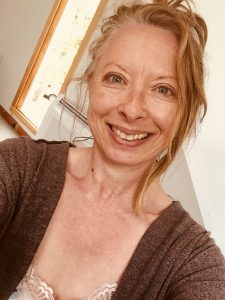– Aviva Goode (she/her)

A week before my father dies, I dream he wants me to take him to the river. There’s no river where he lives in downtown D.C. There’s a large block that we walk around, when he’s up for it, down Massachusetts Avenue to 13th street, up 13th to M street and back to the nursing home. And by walk, I mean I push his wheelchair, bumping over the crooked sidewalks.
When I dream of the river, it’s July 2020. I’m cocooned at home in the Hudson Valley with virtual work, virtual recovery meetings, virtual yoga, and two new traumatized rescue cats who are very much not virtual. Since I canceled my last trip to DC in March, after weighing the risks of bringing the virus with me, I know I’ll probably never see my dad again.
He asks me to take him the river, and I don’t miss a beat, I say, yes, of course. We are both chipper as I button up his shirt and get my things together before we head outside. Then I wake up.
Waking, my thoughts slip into the worn grooves of the recent years of my dad’s Parkinson’s disease with dementia. I travel a sensory terrain made up of sticky food wiped from his fingers and the lull of lifting spoons slowly to his mouth; of what I see, and don’t see, when I look into his big green eyes—my eyes too; of the heft of his body when I lift him partway so he can drink from the water fountain in the hallway. Never in his life did my dad let a chance go by to drink from a water fountain.
Giving my dad care in his last years is, I’m told, also healing the very young part of me that didn’t get unconditional parental love from him. My parents divorced when I was 5 and my dad had moved across the country to start his new family by the time I was 9. He wasn’t around to make me soup when I was sick, to hug me after a bad dream.
I didn’t know what I was missing and it didn’t occur to me to feel hurt, angry, or abandoned. Instead, I embroidered a fantasy: I imagined my dad walking with me to school every morning, down Mapleton Avenue. In my daily mantra, my cat Sunflower also came to school where she stowed away in my locker in a secret compartment at the back, lion witch and wardrobe style, till it was time for us to walk back home after school— me, my dad, and Sunflower.
It’s six months now after the river dream, so six months and a week after my dad died. And it’s like the healing never happened. I’m huddled under my winter coat on a couch away from home at 3 am, feeling the way I used to feel when I was withdrawing from heroin, even though now, in January 2021, I’ve just celebrated ten years clean. This is my first experience of grief and it’s a crazy motherfucking shape-shifter. Tonight it shows up like dopesickness.
CS Lewis wrote: “No one ever told me that grief felt so like fear. I am not afraid, but the sensation is like being afraid. The same fluttering in the stomach, the same restlessness.”
I’m on the couch because I can’t sleep and I can’t lie restlessly anymore next to my sweetly sleeping boyfriend. Nothing is wrong. We didn’t argue and everything is okay in my life, so why do I feel like I’m in a nightmare?
I can’t find a blanket and I’m not about to turn on lights and root around for one, so I’m under my coat. My coat has a fur lined hood that’s tickling me just under my chin. The lining is ripped under one arm but I’ve gotten used to it. I can get used to anything. As I nestle into my scratchy wool cocoon I feel a fetal mood come over me. I’m a seed enclosed in a pod. If I stay inward-turned and quiet, I’ll be safe. I feel safe being unsafe. This is a familiar place—under my coat, on someone’s couch, tiny and hidden in a scary world.
I was a heroin addict for fifteen years, and I lay like this on couches all over NYC, Boulder, and Denver. I spent many hours on the living room couch in the Brooklyn apartment where I copped drugs in the 90s. The couch was stiff and the fake wood coffee table had nothing on it. All of the living in that house happened in Pearl’s bedroom. I was welcome to hang out in there with her and smoke cigarettes or sometimes crack and wait for my guy—Pearl’s son—to come back with the dope. But often I was too dopesick to do anything but lie in pain curled up on the sofa, safe knowing that in minutes or hours I’d feel not just better, but blissful, flying, finally oblivious.
It simplified everything, tunneling back and forth between pain and pleasure. I loved dope—the nodding, the soaring, the sense of god and connection, the omg unbelievable physical pleasure. But I loved the sickness too, the pain and emptiness of withdrawal. It foretold the relief to come and it was a story I knew well.
On this January night deep into the pandemic, I’m back in the crawling skin and aching heart of that thirty-year-old junkie. I’m a vagrant again, crouched under my coat on someone else’s couch, just trying to survive.
But I’m tiny again too. I’m six and alone. I can’t conjure my dad, and without him walking alongside me, I’ve lost my bearings. I’ve lost the plot. I just don’t know how to explain myself to myself. This soul-sickness, this groundlessness, is too much for me tonight. I’ll come out in the morning. I’ll become who I am tomorrow.
“The thing that eats the heart comes wild with years.
It died last night, or was it wounds before,
But somehow crawls around, inflamed with need,
Jingling its medals at the fang-scathed door.” —Stanley Kunitz

No comment yet, add your voice below!